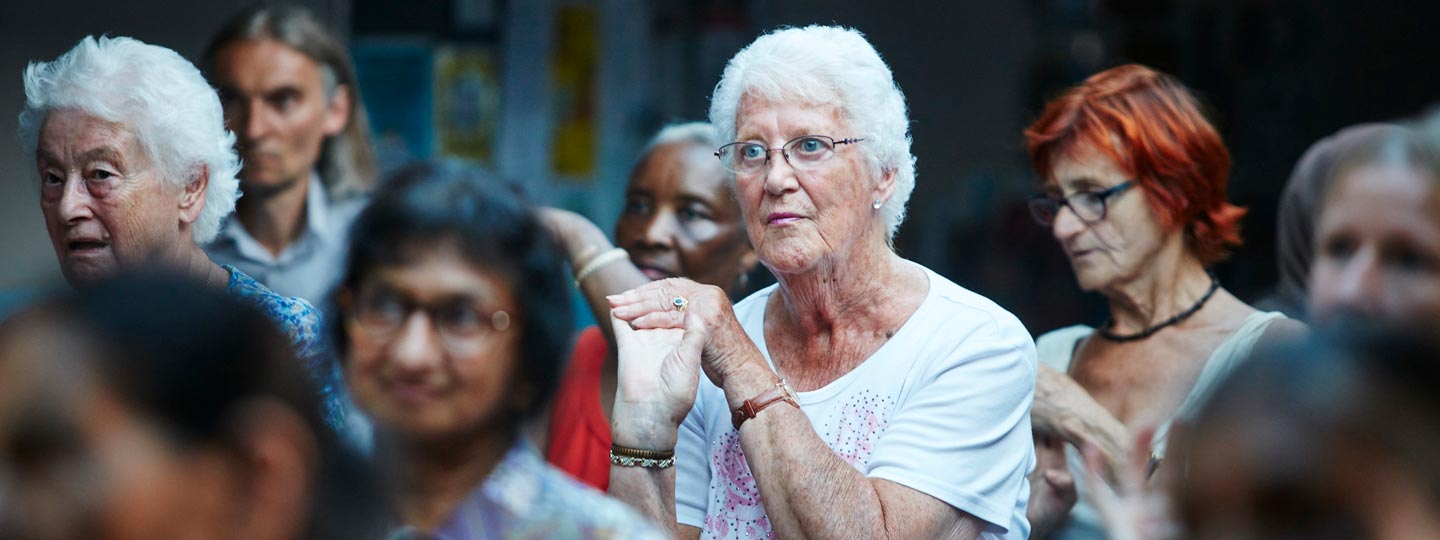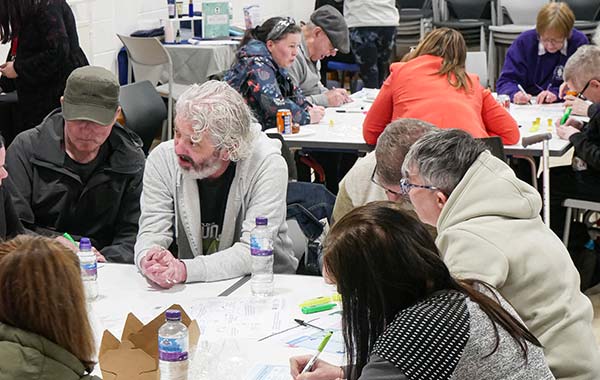Putting the neighbourhood into neighbourhood health service
29 January 2025
Understanding the challenges of MSK health in a deprived community.
“I’m determined to make the NHS more of a neighbourhood health service.”
When Wes Streeting launched his ‘national conversation’ on the future of the NHS in England, he talked about his vision of a ‘neighbourhood health service’ – care closer to home with patients able to see GPs, nurses and other care staff ‘in the same building’.
There is little new in this approach although, as Streeting said, delivering it would be pivotal to reforming the NHS. However, and perhaps stating the obvious, a neighbourhood health service is only possible if there’s a neighbourhood to host it.
The Arthritis Community Health Engagement (ACHE) project
Over the past 18 months, the Arthritis Community Health Engagement (ACHE) project has been working in Drumchapel in the north of Glasgow, engaging with the local community and healthcare professionals, to improve our understanding of what arthritis means in and to the community.
A report ‘Putting the Pieces Together’, which was published on World Arthritis Day 2024, lays out the learning from the work and identifies key themes. Among these, that arthritis is about more than healthcare and that alternatives to formal care are key. People, particularly in areas of high social and economic stress, need to be supported to overcome their own barriers to fully engage with services. Peer support is essential, particularly as, before people can access and benefit from services, a first line of support needs to be built, designed to give people confidence and reassurance.

This might include community support groups or, more formally, community link practitioners, an increasingly essential workforce in working class communities which are facing down the long-term impact of austerity and an ongoing cost of living crisis.
At the heart of the report is the observation that, for people living in poorer communities, who often face multiple challenges, the community centre can be as important as the health centre, the bus driver as the physiotherapist, and the community garden centre as the nearest hospital.
Without these, and the informal opportunities for community connectedness that they represent, the idea of neighbourhood health is undeliverable.
The challenge
For healthcare professionals, community-based or otherwise, the challenge here is to acknowledge that ‘health reflects the relations between people and their living conditions’[1]. This doesn’t make the physiotherapist or the pharmacist responsible for housing policy, community safety and local economic development. People with MSK conditions who live in disadvantaged and highly stressed areas need skilled health professionals as much (and often more) as those who live in more affluent areas.
However, if the physio or pharmacist has insight into how the community works and knowledge of local resources (or knows how to access that knowledge), opportunities to improve health at a neighbourhood level will follow.
In Drumchapel, the ACHE project engaged with a local GP practice to look at where MSK conditions sat in daily consultations and referrals. The practice itself is part of the Deep End[2] project which supports practices working in the 100 most deprived areas in Scotland. It also includes a team of Community Links Practitioners[3].
One of the key lessons from the discussion was that, in the context of the day-to-day work of a Deep End practice, a narrow focus on MSK was unhelpful, a senior partner in the practice saying that “it’s wider than MSK pain” and that patients who present with a mental health problem may have “pain in the background”. As in the community more generally, arthritis needs to be understood in the context of other social and place-based factors. However, it was also mentioned that MSK-related pain is a regular topic at peer learning sessions for GP trainees and of considerable significance to trainees across Glasgow. Indeed, staff from the practice took part in the Versus Arthritis Core Skills training in Glasgow in 2024.
The need for change
However, GPs were also clear about the need for a fundamental shift in practice. The attitude that ‘the GP will fix it’ needs to change and there needs to be a better understanding of patients’ own routes to managing MSK pain. Self-management is key, but it needs to come sooner in the patient journey – ‘the moment is often missed’ - and it needs to be sustainable.
The practice-based Community Link Practitioners (CLPs) supported this perspective in their feedback, presenting their own agenda for sustainable change, i.e.
- People with arthritis not only need services but resources and support to access those services.
- People need support to overcome their resistance to trying something new due to their fear of pain.
- People need reassurance that adopting self-management approaches should not mean that there will be less formal support and fewer services available to them.
For the above to be sustainable, it needs to be rooted in the strength of the community/neighbourhood and the resilience of its informal (and formal) mechanisms for support. In other words, putting the neighbourhood into neighbourhood health.
Read the full ACHE Report - Putting the Pieces Together
Find out more
For further information about ACHE, please contact Alan McGinley, Policy and Engagement Manager, Scotland – a.mcginley@versusarthritis.org
[1] Labonte, R (1998), “A Community Development Approach to Health Promotion”, Health education Board for Scotland
[2] University of Glasgow - Schools - School of Health & Wellbeing - Research - General Practice and Primary Care - The Scottish Deep End Project - About us
[3] The Community Links Practitioners are a third sector workforce, managed by the Health & Social Care Alliance, and based in the Drumchapel Health Centre.